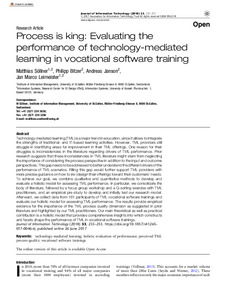| dc.date.accessioned | 2020-10-29T18:11:29Z | |
| dc.date.available | 2020-10-29T18:11:29Z | |
| dc.date.issued | 2018-09-01 | |
| dc.identifier | doi:10.17170/kobra-202010231998 | |
| dc.identifier.uri | http://hdl.handle.net/123456789/11908 | |
| dc.language.iso | eng | eng |
| dc.rights | Namensnennung 4.0 International | * |
| dc.rights.uri | http://creativecommons.org/licenses/by/4.0/ | * |
| dc.subject | technology-mediated learning | eng |
| dc.subject | holistic evaluation of performance | eng |
| dc.subject | perceived TML process quality | eng |
| dc.subject | vocational software trainings | eng |
| dc.subject.ddc | 004 | |
| dc.subject.ddc | 370 | |
| dc.title | Process is King: Evaluating the Performance of Technology-mediated Learning in Vocational Software Training | eng |
| dc.type | Aufsatz | |
| dcterms.abstract | Technology-mediated learning (TML) is a major trend in education, since it allows to integrate the strengths of traditional- and IT-based learning activities. However, TML providers still struggle in identifying areas for improvement in their TML offerings. One reason for their struggles is inconsistencies in the literature regarding drivers of TML performance. Prior research suggests that these inconsistencies in TML literature might stem from neglecting the importance of considering the process perspective in addition to the input and outcome perspectives. This gap needs to be addressed to better understand the different drivers of the performance of TML scenarios. Filling this gap would further support TML providers with more precise guidance on how to (re-)design their offerings toward their customers’ needs. To achieve our goal, we combine qualitative and quantitative methods to develop and evaluate a holistic model for assessing TML performance. In particular, we consolidate the body of literature, followed by a focus group workshop and a Q-sorting exercise with TML practitioners, and an empirical pre-study to develop and initially test our research model. Afterward, we collect data from 161 participants of TML vocational software trainings and evaluate our holistic model for assessing TML performance. The results provide empirical evidence for the importance of the TML process quality dimension as suggested in prior literature and highlighted by our TML practitioners. Our main theoretical as well as practical contribution is a holistic model that provides comprehensive insights into which constructs and facets shape the performance of TML in vocational software trainings. | eng |
| dcterms.accessRights | open access | |
| dcterms.creator | Söllner, Matthias | |
| dcterms.creator | Bitzer, Philipp | |
| dcterms.creator | Janson, Andreas | |
| dcterms.creator | Leimeister, Jan Marco | |
| dc.relation.doi | doi:10.1057/s41265-017-0046-6 | |
| dc.subject.swd | Computerunterstütztes Lernen | ger |
| dc.subject.swd | E-Learning | ger |
| dc.subject.swd | Leistungsbewertung | ger |
| dc.subject.swd | Qualitätssteigerung | ger |
| dc.type.version | publishedVersion | |
| dcterms.source.identifier | EISSN 1466-4437 | |
| dcterms.source.issue | Issue 3 | |
| dcterms.source.journal | Journal of Information Technology (JIT) | eng |
| dcterms.source.pageinfo | 233-253 | |
| dcterms.source.volume | Volume 33 | |
| kup.iskup | false | |


